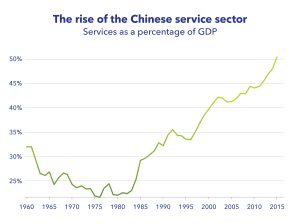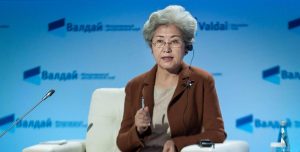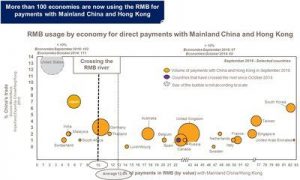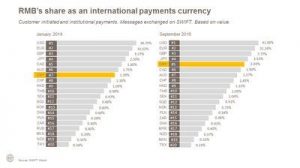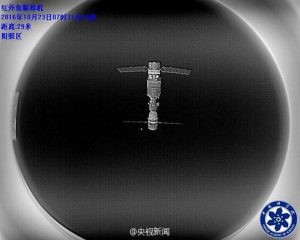China Accounts for Nearly 25% of World Business Travel Spending
According to the GBTA Foundation’s latest business travel forecast, GBTA BTI™ Outlook – China 2016 H2, total business travel spending in China is expected to grow 9.2 percent this year reaching $317.9 billion USD. In 2017, another 8.4 percent increase is expected bringing total Chinese business travel spend to $344.6 billion USD. By comparison, U.S. business travel spending is expected to reach $293.1 billion USD in 2017, a $51.5 billion USD difference, further solidifying China’s new-found position as the largest business travel market in the world.
“China accounts for nearly 25 percent of global business travel spending, up dramatically from a 5 percent share in 2000, demonstrating the truly global nature of today’s economy,” said Michael W. McCormick, GBTA Executive Director and COO.
Additional key findings from GBTA BTI™ Outlook – China 2016 H2 include:
- Domestic business travel comprises over 95 percent of spending on total business travel in China. Following years of double digit growth, as China’s economic expansion continues to slow, GBTA expects growth in domestic business travel spend to slow as well – falling to 9.2 percent this year and 8.6 percent in 2017.
- Despite the slowing economic growth, increased private and public spending on infrastructure continues in anticipation of better days ahead for the Chinese economy. Construction will have obvious long-term benefits to business travelers and companies looking to access cities and regions around the country including the construction of an additional Beijing airport that would accommodate more than 100 million passengers, making Beijing much more accessible to both leisure and business travelers.
- Lower levels of business travel demand should help keep a lid on Chinese travel prices over the next six months. Travel prices have largely outpaced prices on other consumer goods and services over that last five years, but that trend is beginning to reverse. In 2017, GBTA expects air prices in China to increase by just 0.6 percent, however ancillary fees paid by Chinese business travelers are likely to continue their rise as airlines continue to tap non-traditional revenue streams. Hotel price increases will also lag behind general consumer price inflation as demand continues to wane while a healthy hotel construction pipeline remains. GBTA expects a 1.6 percent increase in average daily rates in 2017.
- International outbound business (IOB) travel from China has faced a series of setbacks over the last few years. Most notably, trade demand from markets in North America and Europe has remained weak due to economic contractions. China has also been challenged by the rising value of its currency leading to decreased demand for Chinese exports. GBTA forecasts IOB spending to increase 8.3 percent this year and only 2.6 percent in 2017 reaching $13.9 billion USD.
Africans Mostly Positive About China
This week, Afrobarometer — an African-led research network conducting surveys in 36 African countries — released a report detailing citizens’ attitudes toward China. They’re mostly positive.

Across the countries surveyed, 63 percent of respondents thought China’s economic and political influence in their country was positive. In Mali, 92 percent of citizens said China’s influence in Mali was positive. The countries in which less than half of the respondents had a positive opinion about China’s influence included Algeria, Egypt, Ghana, Lesotho, Madagascar, Morocco and Zimbabwe.
While still positive, the average African opinion on China’s economic development assistance was less enthusiastic. Afrobarometer asked, “In your opinion, does China’s economic development assistance to your country do a good job or a bad job of meeting the country’s needs, or haven’t you heard enough to say?” More than half (56 percent) of the nearly 54,000 survey participants though China’s development assistance was doing a good job in their country, with Malians again having the highest proportion of citizens with favorable attitudes (88 percent).
Why does China have such a positive image in Africa? Afrobarometer asked survey participants to name what factor contributes most to a positive image of China in their country. The most frequent response was China’s investment in infrastructure and development (32 percent), followed by the low cost of Chinese products (23 percent).
Cheap Chinese products, however, are also a source of China’s negative image in Africa. The poor quality of Chinese products was the most significant factor shaping Afrobarometer’s survey participants’ negative images of China — mentioned by 35 percent of respondents. Second to product quality in shaping a negative image of China was the perception among Africans that Chinese take jobs or business from locals — mentioned by 14 percent of respondents.
These mostly positive assessments of China do not necessarily mean China has displaced the West in Africans’ attitudes toward external influences. On the contrary, many Africans (30 percent) see the United States as the most popular model for national development, followed closely by China (24 percent). Likewise, more Africans see their former colonial powers as having the greatest influence (28 percent), compared to China (cited by 23 percent) and the United States (cited by 22 percent).
So, if we had to place this report of citizens’ attitudes on a continuum of concern about China in Africa, it would join the growing chorus of scholars that China’s influence in Africa is not something to be feared.
– Washington Post
China’s Economy Rebalancing Just Fine
Services now account for 50% of China’s GDP, up from 42% 10 years ago, according to World Bank data. This continuing shift may indicate the government’s planned move toward services, innovation, and household consumption as the new economic drivers is going along to plan.
Source: World Bank, World Databank, as of 2015.
Bloomberg reports there are already more than 300 million people working for chinese services companies in retail, restaurants, hotels, and real estate. But the size of the service sectors in both developed and developing nations around the world suggests China still has significant room to grow.
The United States, for example, derives almost 80% of its GDP from services, according to Central Intelligence Agency data. Japan and Germany get more than 71% each, while the United Kingdom and France are both near 80%.
Fellow emerging market countries Brazil, Russia, and India also have greater service sector contributions than China, deriving 67%, 60% and 57% of their GDP from services respectively.
This is a lead China wants to follow, with the country’s 13th Five-Year Plan making raising the service sector’s contribution to GDP a priority. It’s anticipated by China’s leaders that growth driven by consumption and services can drive it to become a high-income nation.
– Business Insider
Forum on Great Power Competition in the 21st Century
This week, the 13th annual Valdai Discussion Club forum, the Russian equivalent of the Swiss-based World Economic Forum or the annual Boao Forum in Hainan, China, convened in the famous resort town of Sochi, better known for hosting the 2014 Winter Olympics. Not surprisingly, the forum, where Russian President Vladimir Putin gave a keynote address, wasn’t covered much by the Western press but the panel for its first session titled World Order: Quo Vadis? featured some heavyweights in the ongoing debate on Sino-US relations.
The main protagonists were Madame Fu Ying, Chairperson of the Foreign Affairs Committee of China’s National People’s Congress and a former vice Foreign Minister and Professor John Mearsheimer, the renowned political realist theorist from the University of Chicago, along with Kevin Rudd, former Prime Minister of Australia now President of Asia Society’s Policy Institute, Sergei Karaganov, a big-wig foreign policy scholar and advisor to the Russian government and an Indian academic. The discussion centered on the transition from an unipolar world under US dominance since the collapse of the Soviet Union to a multi-polar one with Russia and China jointly vying to end the US hegemonic era and attempting to carve out respective spheres of influence.
As a scholar firmly anchored in the realist tradition in international relations, Professor Mearsheimer points out that since the end of the Cold War, the Western and in particular US foreign policy establishment has been dictated by the liberal (neo-liberal) interventionist school. Liberal interventionists’ desire to mold the world in its own image in ideology, political system, and economic structure prompts them to use overwhelming military power coupled with its alliances to enforce its wishes. Political realists, on the other hand, believing in balance of power and spheres of influence, argued for restraint in such areas as the eastward expansion of NATO which forced Russia’s hand in the Crimea, or interventions in the Middle East in pursuit of toppling unsavory regimes that resulted in millions of refugees fleeing to Europe, and confrontation with a rising China in the South China Sea that has caused heightened tension in the region.
In terms of Sino-US relations, Mr Mearsheimer remains a pessimist believing the inexorable rise of China and its expanding political and economic influence throughout East and Southeast Asia pitted against the behavior of the US as the current hegemon in seeking ways to contain that, will inevitably result in conflict. Under this scenario, both powers are captured by the “Thucydides Trap” which in Greek antiquity saw a great war erupt between a rising Sparta versus an Athens feeling threatened by its expansionism. In contrast, speaking from the Chinese perspective, Madame Fu Ying refutes this theory of inescapable conflict.
For Ms Fu, China sees many ills of the US-dominated order, especially its propensity to militarily intervene in Third World countries assisted by developed world partners, and does not wish to repeat those mistakes. At the same time, China will not stand idly by when the US ostracizes its political system and security interests. Neither would other major emerging powers such as Russia or India. It’s not a simple choice of submitting to or challenging American power as Mr Mearsheimer suggests for China upholds an alternative view of the international order centered around the UN.
As a founder, supporter, beneficiary, and more recently reformer of the international system, China finds it comfortable to stay within its framework that has allowed it to prosper for almost forty years. However, shortfalls of the extant system must be addressed; namely, the uneven benefits of globalization, skewed distribution of wealth, unbalanced development, and lack of sufficient oversight over capital flows, not even mentioning the many military incursions spearheaded by the US. China wants a new model of great power relations and global partnership through such initiatives as One Belt One Road, the establishment of the Asian Infrastructure Investment Bank, the new BRICS bank, and various regional China-backed development funds and projects. Rather than feeling insecure, the US should join hands with China for its own gain, Ms Fu urged.
Fundamentally, as China ascends on the world stage, it wants some quid pro quos from the US and its Western allies. First, mutual respect especially in the political arena under which no country tries to impose values and systems on others. Second, the US should not achieve its own absolute security at the expense of the security of others. Instead, there should be more common security where geopolitical rivalries and bloc formation are minimized. Third, in the economic realm, China adheres to “inclusive development”, a theme highlighted at the recent Hangzhou G20 Summit and exemplified by China’s infrastructure and other building throughout Asia, Africa and latin America. Finally, China must better explain itself to the global audience while learning from other countries and being open to new ideas as it develops its own thinking.
In spite of Fu Ying’s appeal, Mr Karaganov remained unconvinced about a new more cooperative order under which America becomes willing to share power with China and Russia. In fact, Russia and China are already working hard to alter and deconstruct the US-led order in different ways – Russia using the big stick and other “hard” means and China through offers of carrots and other “soft” means. Moreover, Messiers Karaganov and Mearsheimer agree that continuing efforts to isolate and confront Russia over Ukraine and Syria, for example, only serve to further drive Russia into the willing embrace of the Chinese. They also perceive the role of the European Union as being relegated to passivity on the world stage largely reliant on the actions of the US, Russia, and China.
101 Countries Using RMB for Payments with Mainland China and Hong Kong
The latest RMB Tracker shows that during the last two years (October 2014 – September 2016), seven new countries are now using the RMB for more than 10% of their direct payments by value with Mainland China and Hong Kong, bringing the total to 57 countries worldwide. The 10% milestone, also known as ‘crossing the RMB river’, is a threshold set by SWIFT to measure the adoption of RMB payments by value with Mainland China and Hong Kong compared to other currencies. Among the 101 countries using the RMB for payments, the weight of these payments by value reached 12.9%, giving the currency a nearly 2% increase since October 2014 (11.2%).
Overall, the RMB kept its position as the fifth most active currency for global payments by value, with an increased share of 2.03%, compared to 1.86% last month. In September 2016, the value of RMB global payments value increased by 10.02% compared to August 2016, which is higher than the average growth of 0.93% for all currencies.
– PRNewswire
Tiangong II’s ‘Selfie Satellite’
Here’s a great new view of China’s Tiangong II space station, taken by a new ‘selfie’ satellite. The Banxing-2 satellite is about the size of a desktop printer and was released from the station on Sunday. It has been nicknamed the “Selfie Stick” by Chinese officials and is taking pictures of the station and the docked Shenzhou XI spacecraft. The Chinese astronauts who boarded the station last week aren’t just joining the selfie craze; the 25 megapixel camera with wide-angle and infrared imagers has a specific job. “The companion satellite monitors the conditions of Tiangong II and Shenzhou XI all the time, which is helpful in detecting failures,” said Chen Hongyu, chief engineer of the micro-satellite.
– Universe Today
Duterte’s Pivot to China and Sino-US Rivalry
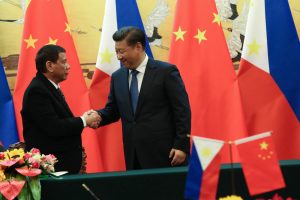
President Rodrigo Roa Duterte and People’s Republic of China President Xi Jinping shake hands to conclude a successful bilateral meeting at the Great Hall of the People in Beijing on October 20. Photo by Toto Lozano/PPD
Philippines President Rodrigo Duterte’s reversal of the confrontational ways of his predecessor toward China has prompted much soul-searching and second-guessing in Washington’s halls of power and at the headquarters of major Western, especially American, media organizations. Indeed, Time magazine deemed Duterte’s statement about a “separation” from the US “stunning”, adding that under the backdrop of acrimonious relations between the two countries over the recent past, the setting was “momentus”. A contributor to Foreign Policy magazine stated outright that it is a “disaster” for US foreign policy.
Underpinning the US’s ‘pivot’ to Asia inaugurated by President Obama and then Secretary of State Clinton, apart from shifting 60% of its military might to Asia-Pacific, is America’s relations with longstanding allies like Japan, South Korea, Australia and Singapore. One of the pillars of that strategy is relatively unfettered access to Philippines bases from which it could seek to hem China within the so-called ‘first-island chain’ linking the Japanese archipelago, Okinawa, the Philippines and Taiwan.
Yet, Philippines foreign policy insiders say openly the Obama Administration has failed to “put meat into its declaration”, leading Duterte to suspend joint military patrols with the US in the South China Sea soon after he assumed office. This week, in a subsequent state visit to Japan after China, Mr Duterte reiterated he wanted foreign military troops (meaning US) out of his country “probably in the next two years.” Pointing to U.S. colonization for over half a century, Duterte said the Philippines will “survive” without U.S. assistance.
Over the summer, President Duterte did not take kindly to high profile criticism from President Obama, the UN, and the EU of his heavy-handed but effective war against the drug lords with the US upping the ante by refusing to sell him arms. In a CCTV interview before his departure to Beijing, Duterte complained, “some other countries know that we are short of money, (but) instead of helping us, all they had done was just to criticize. China never criticizes. They help us quietly. And I said that’s why it’s part of the sincerity of the people”.
In the Chinese capital, Duterte was handsomely rewarded for his win-win statements and reinvigorated spirit of dialogue and cooperation. In trade and investment, the Chinese side agreed to spend US$15 billion on projects to help realize what promises to be the biggest infrastructure boom in the Philippines since the bad old days of dictator Ferdinand Marcos. Much of those facilities will be built by Chinese companies, including railway lines and dredging to enlarge the Cebu International Bulk Terminal Port. Philippines will also partake in China’s One Belt, One Road initiative that involves multi-faceted connectivity along the age-old maritime Silk Road.
In the fallout of Duterte’s ‘pivot, policy makers and analysts on both sides of the Pacific inclined to seeing great power relations in zero-sum game terms are wondering whether it will trigger a ‘bandwagoning’ domino effect on smaller powers toward China or increasing their propensity to ‘balance’ or ‘hedge’ against the rising Asian superpower. The Chinese and Philippines defense ministers’ agreement to restore ties between the two navies undoubtedly called all countries with territorial disputes with China in the South China Sea to attention. Aside from Japan, which has all of its eggs in the American basket, the focus is on third-tier countries like Vietnam that, prior to Duterte’s pivot, was bonding with would-be ally the Philippines and making friendly gestures to its former arch-enemy.
However, in light of Duterte’s harsh anti-Washington rhetoric, Vietnam was already back-peddling from any fabled alliance with would-be partners. Over the summer in Beijing, its defense and foreign ministers sang the praises of time-tested Vietnam-China relations. Then, in October, just prior to Duterte’s China visit, the country hosted the first-ever batch of three Chinese frigates at its newly-opened Cam Ranh international port which during the Vietnam War had served as a strategic deep water bay for the US navy.
This is all in line with Vietnam’s stated policy of non-alignment with any camp despite the warming of relations with the US over the past couple years. Since its opening, Cam Ranh has hosted ships from several countries including, France, Japan, Singapore, and the US. Ha Hoang Hop, a Vietnamese academic with close ties to the Vietnamese authorities told Reuters, “This is actually quite normal, showing that Vietnam is open to all countries and does not take any particular side…Vietnam’s diplomatic policy is not to engage with any military ally, or engage with any country, to oppose a third country.”
Thailand’s China embrace is also somewhat disconcerting to America. The military junta has been courting China since it took power in 2014. Although Thailand is bound by a US military alliance with the US, it has commissioned China to build three submarines and enhanced military relations with China just as Washington suspended military aid over civil liberties concerns about its rule. Thailand has deported suspected Uighur Jihadists cum illegal immigrants en route to third countries and denied entry for Hong Kong “Occupy Central” protest leaders.
Moreover, as the largest trading partner of every country in East and Southeast Asia, China simply holds much sway in Thailand, heavily investing in the country since the coup and flooding its resorts with Chinese tourists. The same can be said of other ASEAN members: successful talks with Myanmar’s new government, building railways and power plants in Laos; various aid and investment projects in Cambodia; enhanced trade with Malaysia; and building high speed rail in Indonesia.
While causing much consternation among American policy makers, and contrary to some US-based pundits who vilify him as an irrational and ideological loose cannon, Duterte is above all a nationalist pursuing an independent foreign policy and looking out for the fundamental interests of his country. At a news conference in his home town early last month, Duterte declared, “in our relations with the world, the Philippines will pursue an independent foreign policy. We will observe, and must insist, I repeat, I must insist, on the time-honoured principles of sovereign equality, non-interference, and the commitment to a peaceful settlement of disputes to best serve our people and protect the interests of our country.”
This is music to Beijing’s ears and history may be in China’s favour, argued political scientist Zhang Baohui of Hong Kong’s Lingnan University. “In the long term, the balance in the region may continue to shift in China’s favour. Duterte has stated explicitly that only China “has the resources” to help the Philippines to achieve genuine economic modernization…This implies that Duterte’s China pivot is motivated in part by China’s rising material capabilities…Therefore, it is plausible that a continuously ascending China may trigger additional bandwagoning behaviour by countries in the region.”
New Book on the Rise of the Renminbi
Eswar Prasad is a renowned economist at Cornell University mentioned before on this blog and an expert on the trajectory of the renminbi (RMB). His most recent book Gaining Currency: The Rise of the Renminbi provides a vivid account of its growing influence around the world but also the challenges and obstacles that lie ahead for the ‘redback’. Its rapid rise following the global financial crisis is shown in the charts below, albeit still at very low level.
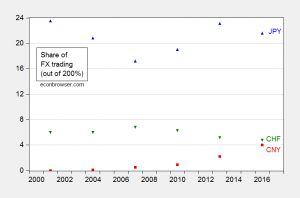
Share of OTC forex turnover accounted for by the RMB (red), the Japanese yen (blue) and the Swiss franc (green).
Mr Prasard is cautiously optimistic about the prospects of the “people’s currency” and he’s probably right that it won’t take over from the dollar anytime soon. However, in the coming decade or two, it will certainly be a strong contender for the no.2 spot, most likely displacing the euro. He also underestimates the Chinese government’s commitment to political, legal and institutional reforms and is wrong that the currency will not attain “safe haven” status for investors. If not Western investors, certainly Asian and developing world investors will want to buy RMB to hedge against crises.
The book’s website writes: Gaining Currency traces the RMB’s ascendancy from revolutionary symbol to reserve currency held by foreign central banks. Prasad reveals the interconnections linking China’s growing economic might, its expanding international influence, and the rise of its currency. If China plays its cards right by adopting reforms that put its economy and financial markets on the right track, the RMB could rival even the euro and the Japanese yen.
Prasad shows, however, that while China has successfully adopted a unique playbook for promoting the RMB, many pitfalls lie ahead for its economy and currency that could limit the RMB’s ascendance. The Chinese leadership is pursuing financial liberalization and limited market-oriented reforms…While the RMB is likely to become a significant reserve currency, it will not attain “safe haven” status as a currency to which investors turn during crises.
Growing European Backlash Against Chinese Investment
In early September, a piece was posted on this blog on the need for reciprocity in investment between China and Canada. Recently, following Chinese appliance giant Midea Group’s takeover of German robot maker Kuka AG, the German government is looking closely at increased oversight of foreign cum Chinese investment in the entire EU.
In the backdrop of growing protectionist sentiment around the world, especially in economically developed nations, China will surely face increasing scrutiny of its investments in key sectors of the economy, particularly those involving advanced manufacturing, technology and information systems.
While recent policy pronouncements by the Chinese government on opening up more sectors to foreign investors is an encouraging sign, China must do more to entice foreign investment, removing impediments in non-strategic sectors of the economy. More must be done to whittle down the ‘negative lists’ in China’s free trade zones and spread that experience to the broader economy. It is in China’s interest to do so given its need to feed a rapidly growing consumer market and to reduce/prevent protectionist backlash overseas.
Germany is seeking tighter control over foreign investment in European companies, in a sign of a growing protectionist reaction to China’s appetite for overseas acquisitions.
Spurred by the purchase of German robot maker Kuka AG by China’s Midea Group Co., Chancellor Angela Merkel’s deputy, Sigmar Gabriel, is calling for European Union measures to give national governments expanded powers to block or impose conditions on shareholdings of non-EU companies. He’s found an ally in EU Digital Economy Commissioner Guenther Oettinger, a German who’s a member of Merkel’s party.
“It’s absolutely right to initiate this debate at the European level,” Oettinger said in an interview last week. “Everybody has to play by the same rules. Clearly, there are many countries, including big ones such as China, that make market access or corporate takeovers difficult or effectively impossible.”
While Merkel hasn’t publicly backed her vice chancellor’s push, Gabriel’s proposal reflects growing resistance within her government to unfettered Chinese investment in Europe’s biggest economy. In the latest potential Chinese bid, lighting maker Sanan Optoelectronics Co. Ltd. said it had held talks with Osram Licht AG on a possible acquisition of the almost century-old German company.
The initiative by Gabriel, who also is Germany’s economy minister, calls for allowing EU member states to step in if a non-EU investor seeks to acquire more than 25 percent of the voting rights in a company, according to a government document obtained by Bloomberg. Restrictions would potentially kick in if the home country restricts foreign investment or its government orders or funds the acquisition.
– Bloomberg on Yahoo Finance
http://finance.yahoo.com/news/german-momentum-grows-curbs-chinese-220001780.html;_ylt=AwrXgCOpew1Y.kMAepDQtDMD;_ylu=X3oDMTBzdmVvZmlwBGNvbG8DZ3ExBHBvcwMxMAR2dGlkAwRzZWMDc3I-
Organ Transplants in China
Notwithstanding the preposterous accusations made by Falungong groups in Canada and elsewhere that the Chinese government systematically harvests the organs of the cult’s followers, accusations that have even been disparaged by ardent anti-China hacks like deceased ‘laogai’ critic Harry Wu, the recent case of a Canadian patient receiving an organ in China after only a short three-day wait sheds light on the need for continued reforms to the current organ transplantation system in the country.
The case raised alarm bells at the Montreal-based Transplantation Society, a NGO that serves as an international forum for the worldwide advancement of organ transplantation. The issues at hand are whether China is meeting its pledge to ban the harvesting of organs from executed inmates made in January 2015 and to what extent does corruption in the system come into play regarding so-called ‘black-market surgeries’ that still occur. In any event, their numbers and the way organs are procured are a far cry from that alleged by international anti-China groups.
Speaking at the plenary session of the 26th international Congress of the Transplantation Society held in Hong Kong last August, Huang Jiefu, director of China’s Organ Donation and Transplantation Committee and a former vice-minister of Health, disclosed that doctors performed 10,057 organ transplants in China last year, about 8.38% of the world total. According to official records, 2,766 organs were donated in 2015, more the total in the two previous years combined. In the first seven months of 2016, 2,152 cases were recorded, up over 49% over the same period last year, with the final tally expected to meet or exceed a total of 4,000 by the end of the year.
The demand for useful organs is massive in China with round 300,000 patients a year waiting for them. The country performs the world’s highest number of organ transplants after only the US. The government readily admits a major shortfall in the number of hospitals and doctors capable of performing transplants. China’s need remains dire in spite of the fact that Chinese donation rates leads Japan and most other Asian countries and donations are the third highest globally albeit far behind the US and most Western nations. In part, this stems from conservative Confucianist ethical beliefs about maintaining the integrity of the body after death along with ingrained cultural biases against organ donation.
In the Canadian case, which happened just prior to the Hong Kong convention, the Tranplantation Society immediately notified director Huang calling for a thorough investigation. In a sign considered positive by the Society, Mr Huang’s officials revoked the licenses of the physician and the hospital involved as they launched a criminal investigation into the allegedly illegal transplant. “Because China is a big country with 1.3 billion people and regional development is uneven, occasional legal violations are unavoidable”, director Huang admitted to reporters at the conference.
Since 2007, China has cracked down on 32 illegal intermediaries, arrested 158 suspects, investigated 17 medical institutions revoking the licenses of 44 medical staff and significantly, shut down 13 ‘black-market dens’, Mr Huang reported to the Society congress. In spite of such successful criminal prosecutions, however, Mr Huang stressed there is a continuing need to forcefully crack down on organ trafficking while legislating more regulations to deal with how organs are procured. A donor registry was piloted in 2010 and has been expanded into a nationwide system. The government has also been encouraging donations with major newspapers publishing positive stories of families donating their loved ones’ organs.
Dr Michael Millis, a transplant specialist at the University of Chicago who has visited several dozen transplant centers in China said before, doctors at those centers used to routinely schedule surgeries but nowadays, they could have multiple surgeries in a single day and then go for a stretch without any. To Dr Millis, that indicates they are operating on the up and down schedule of a system supplied through voluntary donations rather than depending on regular executions of death row inmates. As for allegations of an extensive network of ‘black market dens’, Dr Millis responded, “there is no evidence it is an extensive black market parallel system that would generate a large number of organs from executed prisoners.”
Other doctors stated the recorded usage of drugs given to transplant patients were in synch with China’s reported number of transplants. Dr Francis Delmonico, a professor at the Harvard Medical School and a renowned transplant surgeon remarked, “it is not a matter for us to prove to you that it’s zero…it’s a matter for the government to fulfill what is the law, just as it is in other countries of the world that we go to.” Dr Jose Nunez, an organ transplant advisor to the World Health Organization (WHO) held high praise for China’s progress. “You are taking the country to a leading position within the transplantation world”, he congratulated Chinese participants at the conference.

